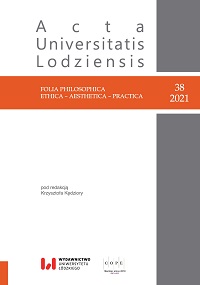“Bodies can be compelled; minds must be turned, since they cannot be compelled”: Preaching as an “Introduction” to Law in the Ecclesiastes of Erasmus of Rotterdam
DOI:
https://doi.org/10.18778/0208-6107.38.05Słowa kluczowe:
Ecclesiastes, Erasmus of Rotterdam, history of law, preaching, renaissance humanismAbstrakt
The recent studies on the relations between humanism or humanists and jurisprudence convince that Reneaissance, especially in XVIth century, when the national states began to raise, belonged to the periods of increased interest in the issue of law. Although Erasmus was not a layer, nor he introduced in any of his works a complete theory of law, he maintained close relations with many leading theoreticians of the law and jurists (Alciati, Budé, Cantiuncula, Zasius) and sometimes spoke in the legal discussions of his age. Among hist most important works concerning the matter of law were: Institutio principis Christiani, Ratio seu Methodus verae theologiae, Christiani matrimonii institutio, De interdicto esu carnium and Ecclesiastes. In the paper I’m going to concentrate on this latter work, in which Erasmus discusses the significance of preaching, preacher and widely understood Christian rhetoric. In the Ecclesiastes Erasmus touches the law subject with the special emphasis on historical character of law and relations between the divine law, the law of Christ and the law of Nature. After a short discussion about his understaning of law I will concentrate on the essential differentiation between the letter of law and the spirit of law, and I will point at proposed by Erasmus ways of introduction of law into human life. Erasmus, on the one hand, escaped a rigidity and abstraction of law and, on the other, he neutralised an aspect of the coercion of law. In his solution Erasmus appreciated the political dimension of preaching and acknowledged preacher as a more important guide of the people, than ruler. I’m going to interpret the Erasmian concept of preaching as an rhetorical mean of introduction of law in analogical way to “introduction” proposed by Plato in his Nomoi.
Bibliografia
Christ von Wedel, C. (2013). Erasmus of Rotterdam. Advocate of a New Christianity. London: University of Toronto Press, Toronto, Buffalo.
Google Scholar
DOI: https://doi.org/10.3138/9781442665712
Coing, H. (1964). Römisches Recht in Deutschland. Milan: Giuffrè.
Google Scholar
Erasmus of Roterdam (1969–). Opera omnia Desiderii Erasmi Roterodami. Amsterdam: Brill (abbreviated as ASD).
Google Scholar
Erasmus of Rotterdam (1975–). Collected Works of Erasmus. Toronto: University of Toronto Press (abbreviated as CWE).
Google Scholar
Erasmus of Rotterdam (1997). The Education of a Christian Prince, trans. N. M. Cheshire, M. J. Heath, Cambridge: Cambridge University Press
Google Scholar
Goldsmith E. C. (1988). Exclusive Conversations: The Art of Interaction in Seventeenth-Century France. Philadelphia: University of Pennsylvania Press
Google Scholar
DOI: https://doi.org/10.9783/9781512807158
Hall, J. (1956). Plato’s Legal Philosophy. Indiana Law Journal, 31 (2), pp. 171–206.
Google Scholar
Heckel, J. (2010). Lex charitatis. A Juristic Diquistition on Law in the Theology of Martin Luther. Translated by G. G. Krodel. Grand Rapids, Michigan: William B. Eerdmans Publishing Company.
Google Scholar
McCullough, C. D. (1978). The Concept of Law in the Thought of Erasmus of Rotterdam. Unpublished doctoral dissertation. Atlanta: Emory University.
Google Scholar
McCullough, C. D. (1981). The Concept of Law in the Thought of Erasmus. Erasmus of Rotterdam Society: Yearbook One, pp. 89–112.
Google Scholar
DOI: https://doi.org/10.1163/187492781X00076
Plato (1956). Laws. Translated by. R. G. Burry, vol. 1–2. London: The Loeb Classical Library.
Google Scholar
Ullmann, W. (1985), Law and Politics in the Middle Ages. An Introduction to the Sources of Medieval Political Ideas. New York: Cambridge University Press.
Google Scholar
Witte, J. jr. (2004). Law and Protestantism. The Legal Teachings of the Lutheran Reformation. Cambridge: Cambridge University Press.
Google Scholar
Wozniak, J. T. (1996). A Time for Peace. The Ecclesiastes of Erasmus. Los Angeles: University Press of the South New Orleans.
Google Scholar
Pobrania
Opublikowane
Jak cytować
Numer
Dział
Licencja

Utwór dostępny jest na licencji Creative Commons Uznanie autorstwa – Użycie niekomercyjne – Bez utworów zależnych 4.0 Międzynarodowe.












